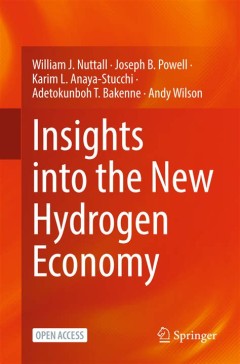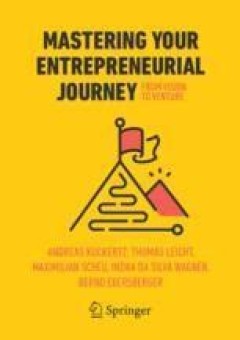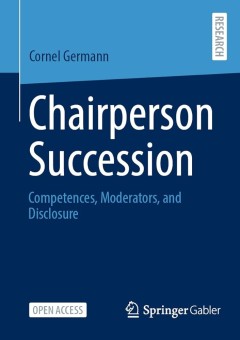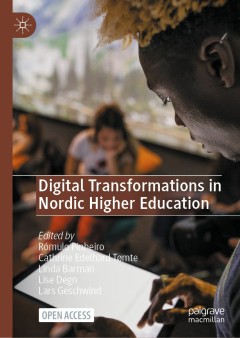Filter by

Secularization and China's Modernization
This open access book examines from the perspective of secularization. Since the publication of Max Weber's Protestant Ethics and the Spirit of Capitalism, how to realize modernization in developing countries has become an urgent problem to be demonstrated. Secularization has becoming endogenous power for Chinese modernization procedure, especially since 1978. However, to understand the foundat…
- Edition
- 1
- ISBN/ISSN
- 9789819780624
- Collation
- XI, 402 hlm; ill., lamp.,
- Series Title
- -
- Call Number
- -

Differenzerleben als Balanceakt = Eine Grounded Theory zu medienbezogenen Bil…
In diesem Open-Access-Buch wird der Frage nachgegangen, inwiefern medienbezogene Bildungsprozesse in Paarbeziehungen stattfinden. In der heutigen Informationsgesellschaft stehen Individuen in einer Paarbeziehung vor der Herausforderung, mit digitalen Transformationsprozessen umzugehen. Hierzu liegt eine Vielzahl von Studien vor, die Veränderungen durch Medien im Paaralltag untersuchen. Doch hi…
- Edition
- 1
- ISBN/ISSN
- 9783658460143
- Collation
- XIX, 362hlm; ill., lamp.,
- Series Title
- -
- Call Number
- -

Strengthening European Climate Policy = Governance Recommendations from Innov…
This open-access book foregrounds 10 novel collaborations between the Social Sciences and Humanities (SSH), and Science, Technology, Engineering and Mathematics (STEM) disciplines, for strengthening European climate policy. Part of a three-volume collection covering climate, energy, and mobility policy.
- Edition
- 1
- ISBN/ISSN
- 9783031720550
- Collation
- XXXV, 163 hlm; ill., lamp.,
- Series Title
- -
- Call Number
- -

Insights into the New Hydrogen Economy
This open access book offers a comprehensive exploration of the future of the hydrogen industry. It builds upon insights gathered from a series of expert workshops and follow-on activity. International experts from various fields, including industry, public policy, and academia, engaged in dialogue and knowledge exchange, resulting in invaluable findings and observations. This book builds upon…
- Edition
- 1
- ISBN/ISSN
- 9783031718335
- Collation
- XXIX, 162 hlm; ill., lamp.,
- Series Title
- -
- Call Number
- -

Mastering Your Entrepreneurial Journey = From Vision to Venture
Entrepreneurship is a powerful force for change and innovation; you can be a part of it. This open access book is your key to unlocking your potential as an entrepreneur and impacting the world through your actions. Written by experienced startup guides and backed by rigorous academic research, this book takes you through the essential steps along your entrepreneurial journey. This unique mix …
- Edition
- 1
- ISBN/ISSN
- 9783031710643
- Collation
- XIV, 140 hlm; ill., lamp.,
- Series Title
- -
- Call Number
- -

Ein Physiologiemodell für Tactical Combat Casualty Care Training in mobilen …
Julia Hofmann konzipiert in diesem Open Access Buch ein Physiologiemodell für die präzise Simulation bestimmter Verletzungsfolgen und deren Behandlung in einer Computerspielumgebung. Ihre Ergebnisse leisten einen wichtigen Beitrag, um die Ausbildung von Einsatzkräften in der taktischen Verwundetenversorgung mit neuen Medien zu verbessern. Primäre Zielgruppe sind dabei die sogenannten Erst-H…
- Edition
- 1
- ISBN/ISSN
- 9783658302023
- Collation
- XXXV, 347 hlm; ill., lamp.,
- Series Title
- -
- Call Number
- -

Re-presenting Research A Guide to Analyzing Popularization Strategies in Sci…
This open access book focuses on the textual features, or ‘strategies’, which form popularization discourse. In popularization discourse, research findings from academia are re-presented to make them noteworthy to society and influential for everyday life. Popularization involves recontextualization, or reimagination of findings in an everyday and newsworthy context, and reformulation, the …
- Edition
- 1
- ISBN/ISSN
- 978-3-031-28174-7
- Collation
- XI, 141
- Series Title
- -
- Call Number
- -

Pluralistic Struggles in Gender, Sexuality and Coloniality = Challenging Swed…
This open access book seeks to understand how politics is being made in a pluralistic sense, and explores how these political struggles are challenging and transforming gender, sexuality, and colonial norms. As researchers located in Sweden, a nation often cited as one of the most gender-equal and LGBTQ-tolerant nations, the contributions investigate political processes, decolonial struggles, a…
- Edition
- 1
- ISBN/ISSN
- 9783030474324
- Collation
- XIII, 316 hlm; ill., lamp.,
- Series Title
- -
- Call Number
- -

Chairperson Succession :Competences, Moderators, and Disclosure
This open access book empirically analyses the competences (input), moderators (process), and disclosure (output) of board chair succession practices for publicly listed organisations in Switzerland. As primus inter pares (Latin for first among equals), the chair of the board of directors holds a unique organisational position. For fulfilling the non-transferable duties pursuant to Article 716a…
- Edition
- 1
- ISBN/ISSN
- 978-3-658-40817-6
- Collation
- XXI, 261
- Series Title
- -
- Call Number
- -

Digital Transformations in Nordic Higher Education
This open access book expands the scholarly and policy debates surrounding digital transformation in higher education. The authors adopt a pluralistic conceptual framework which uncovers three analytical elements – contexts, mediations, and type of effects – for unpacking empirical manifestations. The publicly funded higher education systems in Nordic countries provide solid empirical insig…
- Edition
- 1
- ISBN/ISSN
- 978-3-031-27758-0
- Collation
- XIX, 278
- Series Title
- -
- Call Number
- -
 Computer Science, Information & General Works
Computer Science, Information & General Works  Philosophy & Psychology
Philosophy & Psychology  Religion
Religion  Social Sciences
Social Sciences  Language
Language  Pure Science
Pure Science  Applied Sciences
Applied Sciences  Art & Recreation
Art & Recreation  Literature
Literature  History & Geography
History & Geography